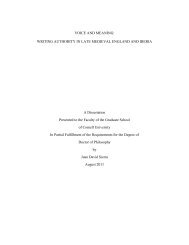Briana Anderson - Cornell University
Briana Anderson - Cornell University
Briana Anderson - Cornell University
Create successful ePaper yourself
Turn your PDF publications into a flip-book with our unique Google optimized e-Paper software.
or negative reputation. Second, decision-makers should not rely on the ‘what is<br />
beautiful is good’ conception. This thesis indicates that in a message with social<br />
connotations, people are not merely looking for a pretty face. In fact, this thesis<br />
suggests that those who are personally involved in a serious issue such as breast<br />
72<br />
cancer will view a pretty face negatively (and this assumes that the person viewing the<br />
ad will not have any preexisting attitudes toward the person involved).<br />
Additionally, this thesis supports the idea that decision-makers should consider<br />
the type of company they are when choosing an endorser. In this thesis, the attractive<br />
endorser received significantly higher ratings for the cosmetics company (beauty-<br />
related) than the pharmaceutical company (though it is important to note that the<br />
unattractive endorser got higher ratings for both company types).<br />
What this thesis should clearly communicate to PR and marketing<br />
professionals making CSR decisions is that marketing research is a necessary<br />
component to their choosing of endorsers. These professionals need to consider (and<br />
discover!) what is important to their targeted audience, whether an internal or external<br />
endorser is more credible and should not follow on the heals of advertising where a<br />
pretty face will automatically equal greater credibility. Choosing a credible endorser<br />
is certainly important as the connection between endorser and organizational<br />
credibility is supported by this study (as well as intuition).

















